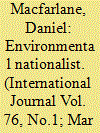|
|
|
Sort Order |
|
|
|
Items / Page
|
|
|
|
|
|
|
| Srl | Item |
| 1 |
ID:
138287


|
|
|
|
|
| Summary/Abstract |
During the 1950s, Canada and the United States worked together to develop a North American air defence system. While the military cooperation generally worked well, some difficulties did occur. These problems in the relationship were almost always the result of concerns from within the Canadian government and the Department of External Affairs that the air defence measures posed political problems and were a threat to Canada’s sovereignty. In the fall of 1954, opposition to further improvements to the continental air defence system emerged from a different source: General Charles Foulkes, the chairman of the Chiefs of Staff Committee. He believed that radioactive fallout from ground bursts of thermonuclear weapons in a war with the Soviet Union would pose insurmountable problems for the air defence effort. Thus, the countries needed to conduct a joint reappraisal of the air defence problem. This article will explore Foulkes’ position and examine what lessons can be drawn from this experience.
|
|
|
|
|
|
|
|
|
|
|
|
|
|
|
|
| 2 |
ID:
178327


|
|
|
|
|
| Summary/Abstract |
Prior to 1945, General Andrew George Latta McNaughton had already made a name for himself as an army general, engineer, inventor, and cabinet minister. After 1945, McNaughton occupied a number of key international roles for Canada: at the United Nations, on the Permanent Joint Board on Defence, and on the International Joint Commission. Even though he became one of Canada’s most important diplomatic actors during the early Cold War period, this aspect of his career has been mostly ignored by international historians. This article examines McNaughton’s key involvement in the evolution of a number of Canada–US water megaprojects, arguing that his nationalism underpinned his approach to bilateral relations, which combined deep technical expertise with a willingness to publicly assert the Canadian national interest. McNaughton’s approach should be studied not only to better understand North American environmental diplomacy in the Cold War but also to draw from it several lessons for contemporary times.
|
|
|
|
|
|
|
|
|
|
|
|
|
|
|
|
| 3 |
ID:
167221


|
|
|
|
|
| Summary/Abstract |
Dating to the early Cold War, Canada and the US have disagreed on the status of the Northwest Passage. For Canada, the waters of the Arctic Archipelago are internal, historic waters. For the US, the sea route is an international strait. Despite this fundamental disagreement, cooperation between the two states in the Arctic has long been effective and friendly. In part, this can be attributed to decades of careful diplomacy, which has strategically set aside the intractable legal questions in favour of a comfortable “agree-to-disagree” arrangement. In the age of MAGA diplomacy under President Donald Trump, this successful system appears at risk. With discussion of Arctic freedom of navigation voyages for the US Navy becoming commonplace, and the old diplomatic safeguards breaking down in favour a new zero-sum foreign policy approach, Canada may soon face a new challenge to its Arctic sovereignty.
|
|
|
|
|
|
|
|
|
|
|
|
|
|
|
|
|
|
|
|
|